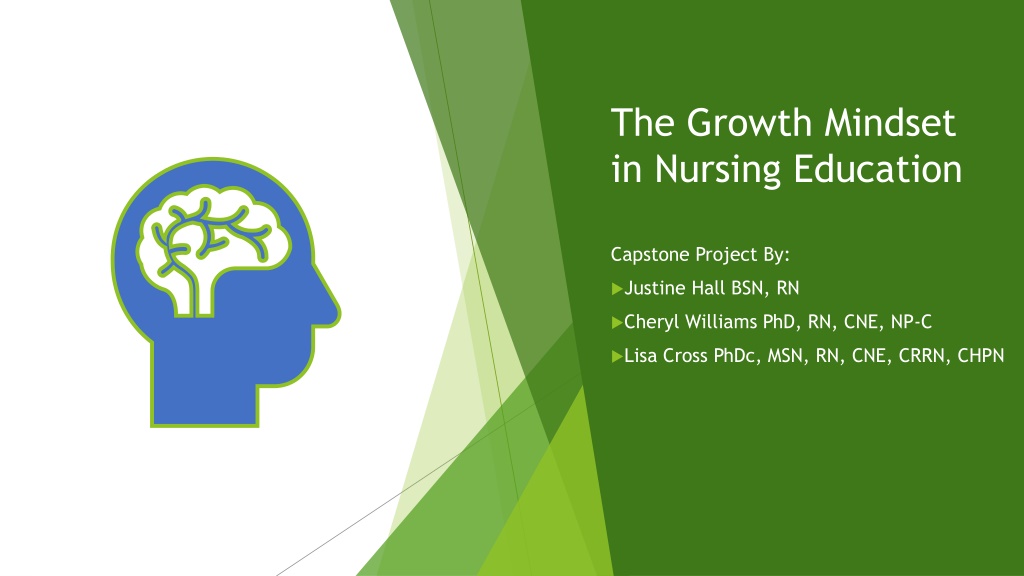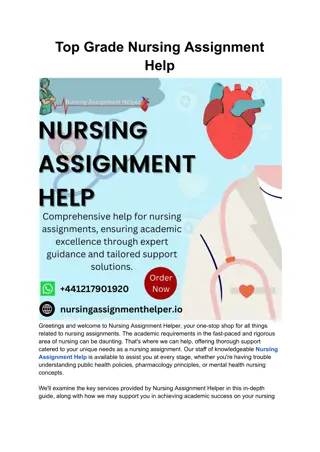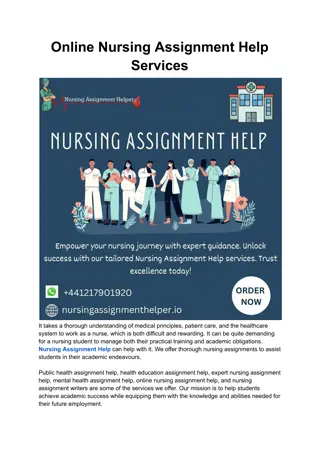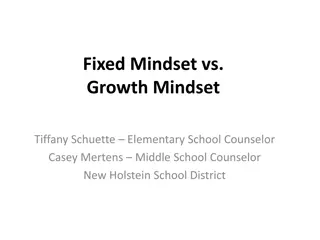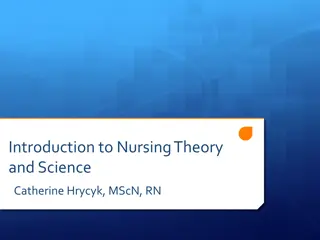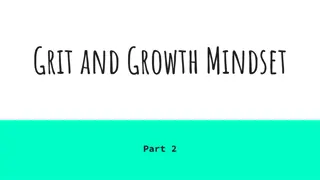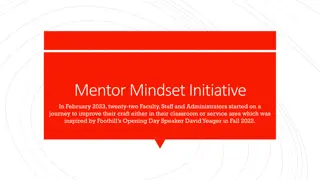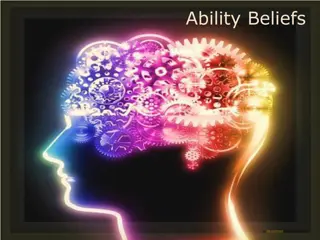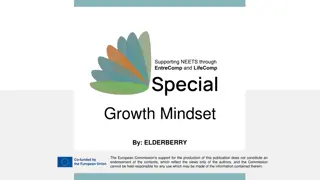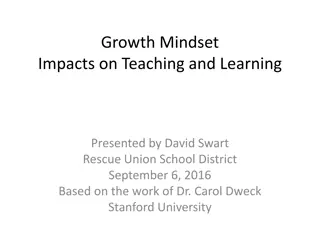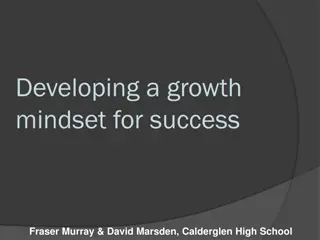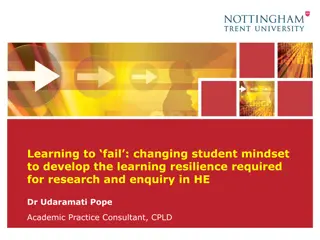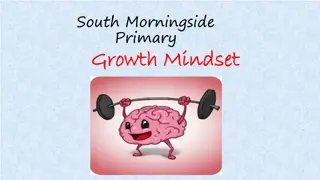Understanding Growth Mindset in Nursing Education
Exploring the benefits of adopting a growth mindset in nursing education for improving student engagement, belonging, and academic success. Discusses the impact of mindset, grit, and engagement on student learning and presents a method of surveying nursing school administrators to understand study strategies. A call to action for nursing faculty to incorporate growth mindset principles for enhancing the education experience and passion for nursing.
Download Presentation

Please find below an Image/Link to download the presentation.
The content on the website is provided AS IS for your information and personal use only. It may not be sold, licensed, or shared on other websites without obtaining consent from the author. Download presentation by click this link. If you encounter any issues during the download, it is possible that the publisher has removed the file from their server.
E N D
Presentation Transcript
The Growth Mindset in Nursing Education Capstone Project By: Justine Hall BSN, RN Cheryl Williams PhD, RN, CNE, NP-C Lisa Cross PhDc, MSN, RN, CNE, CRRN, CHPN
What is a Mindset? Growth VS Fixed Carol Dweck (2016) has been at the forefront of mindsets and how they can be predictors of student s success in learning. The mindset model suggests that attributes of growth mindset students have greater academic success. Growth Mindset Fixed Mindset Mixed Mindset believe that intelligence is malleable believe that intelligence is fixed Attributes of both remain in engaged in learning avoid challenges fear of failure persist through challenges don t remediate remediate
Many disciplines have adopted the growth mindset into their teaching models. Gap in Nursing Education As shown in the literature review, educators and students that have adopted the growth mindset are more engaged, have a stronger sense of belonging, grittier and ultimately have greater academic success. Nursing education has not incorporated the growth mindset into its philosophy of teaching, this could be a detriment to future students who could have greater academic success in nursing.
Review of the Literature A literature review was conducted on how mindsets, engagement, belonging, grit influence student success in undergraduate students of any discipline. Grit was positively linked to self regulated learning and engagement, which could be a contributing factor to student success (Wolters & Hussain, 2014), (Kannangara, Allen, Waugh, Nahar, Khan, Rogerson, & Carson, 2018). Grit Students who believed that intelligence was incremental and could be improved (i.e. the growth mindset) were correlated with active learning strategies, self-efficacy, collaboration among peers and knowledge-building behaviors (Stump, Husman & Corby, 2014). Engagement Students who felt that they belonged in their environment and students felt safe and comfortable, had a higher engagement and persistence in their learning (Hoyert, Ballard, & Odell, 2019). Belonging
Facilitate a conversation with nursing faculty about how teaching a growth mindset to nursing students will improve their education experience, learning, and their passion for nursing. Research Goal
Method A web-based survey of 34 questions entitled Nursing Students Study Strategies was distributed through email to 500 nursing school administrators across the United States. This study was granted IRB approval. 23 question items regarding grit, belonging, and engagement were weighed on a Likert type five-point scale ranging from very much like me (scored 5) to not like me at all (scored 1). For some items, the scoring was reversed. 10 questions taken from the Duckworth (2007) Grit Scale, 13 questions are taken from the Student Belongingness, Engagement and Self Confidence Survey (Yorke, 2016) with 6 items relating to belonging and 7 items relating to engagement. Dweck s (2006) 3 mindset questions the determine a student s fixed, mixed or growth mindset. These questions asked the user to answer each on scale from 0 to 100 (0 being I agree and 100 being I do not agree ). An additional adapted mindset question was added that specifically relates to nursing students. The scores of these questions are then summated to determine the mindset of the student. 0-160 is a fixed mindset, 161-240 is a mixed mindset and 241-400 is a growth mindset. 7 questions that gather demographic data (i.e. gender, age, etc.). Participants remained anonymous.
Content Validity The content validity was carried out through a convenience sample of 4 nursing experts. The mean proportion of expert responses was .92. There was agreement that nine of the 13 items were relevant. The mean item-level CVI was .92, indicating strong agreement that the items were comprehensive, balanced, and relevant to the population. The scale-level content validity index, universal agreement (S-CVI/UA) was .69. Two items that were not in consistent agreement among experts were on the belongingness domain and two items were from the engagement domain. Each of these four items had an item CVI (I-CVI) of .75. Dweck s 3 mindset questions have a reliability of 0.93-0.98. The additional adapted mindset question that specifically related to nursing students was determined to have a reliability of 0.85.
Sample 108 nursing students responded to the survey and 102 completed the survey in its entirety. 92 of 102 identified as female, 9 as male, and 1 responded I prefer not to answer . Nursing Program 100% Highest Level of Education 89.2% 1% 1% 80% 4.9% 6.9% 6.9% 16.7% 60% 54.9% 28.4% 48% 43.1% 40% 67.9% 20% 18.6% 9.8% 2% 1% 0% LPN BSN MSN ADN Accel. BSN PhD Have you failed any prerequisite courses for nursing? Has anyone taught to you how to learn? High School Associates Bachelors Masters Yes No Prefer not to Answer
Results All results are taken from the 102 entirely completed surveys Nursing Student's Summated Mindset Summated Mindset and Grit (N =102, rho = 0.231, p. value = 0.019) 17.6% Summated Mindset and Belonging (N = 102, rho = 0.307, p. value = 0.002) Summated Mindset and Engagement (N = 102, rho = 0.053, p. value 0.599) 16.7% Self Reported GPA and Belonging 65.7% (N = 102, rho = 0.209, p. value = 0.041) Self Reported GPA and Engagement (N = 102, rho = 0.275, p. value = 0.007) Growth Mixed Fixed
Discussion Mindsets, Belonging and GPA Mindsets, Engagement and GPA Mindsets and Grit Our findings reveal the more student s orient with a growth mindset there is a positive association with also having a strong sense of belonging within their nursing program. Our study has also shown that there is indeed at least a weakly positive correlation between belonging and self-reported GPA. Results have shown that there is a statistically significant positive correlation between mindsets and grit. Our data shows that has the sum of mindsets increases (i.e. the students who have growth mindsets) so does the student s grittiness. Our data did not reflect any statistically significant correlation between growth mindsets and engagement. However, another result from our survey shows a positively significant relationship between engagement and student s self-reported GPA.
Limitations and Implications Limitations Small sample size, electronic delivery, timing within school year, global pandemic, student mindset, social bias. Implications Re-administer the survey to a much larger sample size of nursing students! Correlation between belonging and tendency to be growth mindset learner Correlation between belonging and GPA Grit is associated with the growth mindset presents compelling evidence that the growth mindset model should be integrated into nursing education.
Final Thoughts The results of this study provide compelling evidence that the growth mindset model should be integrated into nursing education as well as future research.
References Dweck, C. S. (2016). Mindset: the new psychology of success. New York: Random House. Duckworth, A. L., Peterson, C., Matthews, M. D., & Kelly, D. R. (2007). Grit Scale. Retrieved from PsycTESTS. doi:https://dx.doi.org/10.1037/t07051-000 Hodge, B., Wright, B., & Bennett, P. (2017). The Role of Grit in Determining Engagement and Academic Outcomes for University Students. Research in Higher Education, 59(4), 448 460. doi: 10.1007/s11162-017-9474-y - Hoyert, M., Ballard, K., & Odell, C. (2019). Increasing Student Success through a Cocktail of Cognitive Interventions. Journal of the Scholarship of Teaching and Learning, 19(1), 128 134. doi: 10.14434/josotl.v19i1.26778 Kannangara, C. S., Allen, R. E., Waugh, G., Nahar, N., Khan, S. Z. N., Rogerson, S., & Carson, J. (2018). All That Glitters Is Not Grit: Three Studies of Grit in University Students. Frontiers in Psychology, 9. doi: 10.3389/fpsyg.2018.01539 Lewis, L. S., Williams, C. A., & Dawson, S. D. (2020). Growth Mindset Training and Effective Learning Strategies in Community College Registered Nursing Students. Teaching and Learning in Nursing, 15(2), 123 127. doi: 10.1016/j.teln.2020.01.006 Stump, G. S., Husman, J., & Corby, M. (2014). Engineering Students Intelligence Beliefs and Learning. Journal of Engineering Education, 103(3), 369 387. doi: 10.1002/jee.20051 Wolters, C. A., & Hussain, M. (2014). Investigating grit and its relations with college students self-regulated learning and academic achievement. Metacognition and Learning, 10(3), 293 311. doi: 10.1007/s11409-014-9128-9 Yorke, M. (2016). Student Belongingness, Engagement and Self-confidence Survey. Retrieved from PsycTESTS. doi:https://dx.doi.org/10.1037/t48020-000
